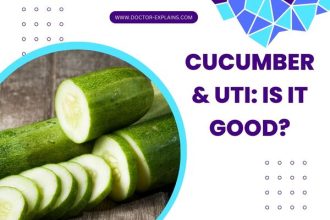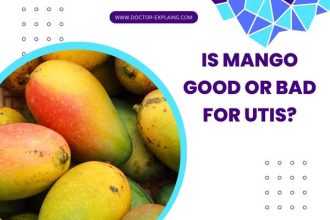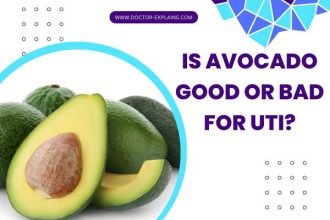In a Nutshell:
Apples can be a valuable addition to your diet if you have a UTI. Although they aren’t a direct cure, they can support overall health, and immunity, and may help prevent UTIs. Moreover, apples are unlikely to worsen UTI symptoms as they are weakly acidic and don’t cause significant bladder irritation.
Key insights:
- Apples are safe to eat during a UTI and don’t worsen symptoms.
- They are not a direct cure for UTIs; antibiotics are the most effective treatment.
- Apples can help with hydration, which is important for flushing out bacteria.
- They contain nutrients and compounds like vitamin C and antioxidants to support immunity.
- Plant compounds in apples may help combat infections and support overall health.
- Fruits high in vitamin C, antioxidants, and water content are beneficial for UTI management.
- Apples alone cannot prevent UTIs but can contribute to overall wellness and reduced risk.
- Apples do not cause UTIs; maintaining good hygiene and a balanced diet is essential.
Fact [1]: Apples are safe to eat if you have a UTI.
Apples are generally harmless to consume if you have a UTI. They are nutritious fruit that can supply essential vitamins, minerals, and other nutrients that support overall health.
After reviewing the research, I‘ve concluded that there is no evidence suggesting that apples would make UTI symptoms worse or interfere with medical treatments.
In fact, they may offer several advantages that can help your body fight the infection and aid in recovery.
The table below contains other fruits to eat and to avoid with UTI:
| FRUITS & UTI | ||
|---|---|---|
| Eat Safely | Eat with Caution | Better avoided |
| Dates without preservatives, coconut without preservatives, pears, apples, homemade applesauce, watermelon | Bananas, brown raisins, cherimoya, citrus peels, Crenshaw melon, dried currants, Gala apples, honeydew, mango, maraschino cherries, rhubarb | Apricots, all citrus fruit, cantaloupe, cherries, dried fruit peaches, most plums, most dried figs, golden raisins, grapes, guava, kiwi fruit, most berries, passion fruit, papaya, persimmon, pineapple, starfruit |
Fact [2]: Apples are beneficial, but they’re NOT a direct cure for UTI.
While apples can contribute to a healthy diet during a UTI, it is crucial to recognize that they are not a direct treatment for the infection.
UTIs are typically caused by bacteria, and the most effective treatment for bacterial infections is antibiotics prescribed by a healthcare professional. Apples can be a useful addition to your diet while undergoing medical treatment, but they should not be considered a substitute for proper medical care.
Learn more about the benefits of apples.
Fact [3]: Apples are unlikely to worsen UTI symptoms.
There is no evidence to suggest that apples would aggravate UTI symptoms. In fact, their high water content can help with hydration, which is vital for flushing out bacteria and reducing symptoms.
Also, apples are a good source of dietary fiber, which can help maintain a healthy digestive system and prevent constipation—a condition that can worsen UTI symptoms. Therefore, apples can be part of a balanced diet for individuals with UTIs without causing adverse effects.
Fact [4]: Apples can boost your overall immunity (including immunity against UTI-causing bacteria).
Apples contain several nutrients and compounds that can help support your immune system, including vitamin C and antioxidants.
Vitamin C is known for its immune-boosting properties, and a robust immune system is essential for fighting off infections, including UTIs.
Antioxidants found in apples can help protect cells from damage caused by free radicals, which may contribute to a stronger immune system. By providing these nutrients, apples can help support overall immunity, including the body’s ability to combat UTI-causing bacteria.
Fact [5]: Apples are rich in Phytochemicals.
Apples contain a variety of phytochemicals, including flavonoids, phenolic acids, and others. At the same time, the concentration of these compounds can vary depending on the apple variety and growing conditions. Apples can contribute to your overall phytochemical intake as part of a balanced diet. These phytochemicals may help your body combat infections and support overall health.
The most important phytochemicals in apples include:
- Polyphenols: Antioxidant compounds, including flavonoids (quercetin, catechin, epicatechin, phloridzin), procyanidins, and chlorogenic acid.
- Carotenoids: Fat-soluble pigments like beta-carotene, lutein, and zeaxanthin, which support eye health and have antioxidant properties.
- Triterpenoids: Organic compounds in apple peels, such as ursolic acid, with potential anti-inflammatory, anti-cancer, and anti-obesity effects.
- Pectin: A soluble fiber that supports digestive health, improves cholesterol levels, acts as a prebiotic for beneficial gut bacteria, and is a potential protector from UTI.
FAQs:
What fruits should I eat or avoid if I have a UTI?
Fruits that are beneficial for individuals with UTIs include those high in vitamin C, antioxidants, and water content. Examples include apples, blueberries, cranberries, and oranges. These fruits can help support immune function and hydration, which are crucial for combating UTIs. Conversely, it is best to avoid fruits high in sugar, as excessive sugar consumption can increase the risk of UTIs. Also, avoid fruits that may irritate the urinary tract, such as citrus fruits, if you are sensitive to them.
Do apples help prevent UTIs?
Apples alone cannot prevent UTIs. However, consuming a diet rich in fruits and vegetables, including apples, can support overall health and reduce the risk of infections. Apples provide essential nutrients, hydration, and plant compounds that can contribute to a strong immune system and a healthy body. While apples are not a direct preventive measure, they can be part of a balanced diet that promotes overall wellness and reduces the likelihood of developing UTIs.
Can apples cause UTIs?
There is no evidence to suggest that apples can cause UTIs. UTIs are primarily caused by bacteria, most commonly Escherichia coli (E. coli), which can enter the urinary tract and multiply, leading to infection. Apples are not a source of these bacteria and do not directly contribute to the development of UTIs.Instead, apples can support overall health and provide nutrients that may help the body fight off infections, including UTIs. It is important to maintain good hygiene practices, stay hydrated, and consume a balanced diet, including fruits like apples, to reduce the risk of UTIs and support overall health.
Can acid in apples worsen UTI symptoms?
Some sources suggest that certain acidic foods may worsen UTI symptoms, but there is limited research to support this claim. Apples do contain some acids, such as malic acid, citric acid, oxalic acid, and ascorbic acid (vitamin C), but they are not considered highly acidic foods (reference).
In fact, some studies have suggested that vitamin C may help prevent UTIs by acidifying the urine, making it more difficult for bacteria to grow.
My conclusions:
Eat apples; they’re safe to eat if you have UTI. Apples can be a beneficial addition to your diet if you have a UTI or want to support overall health and reduce the risk of infections.
While they are not a direct cure or preventive measure for UTIs, apples provide essential nutrients, hydration, and plant compounds that can help support immune function and overall wellness.
Also, apples are unlikely to worsen UTI symptoms and can be safely consumed by those affected by the condition. Including apples in a balanced diet, along with other healthy fruits and vegetables, can contribute to a strong immune system, better overall health, and potentially a lower risk of developing UTIs.






